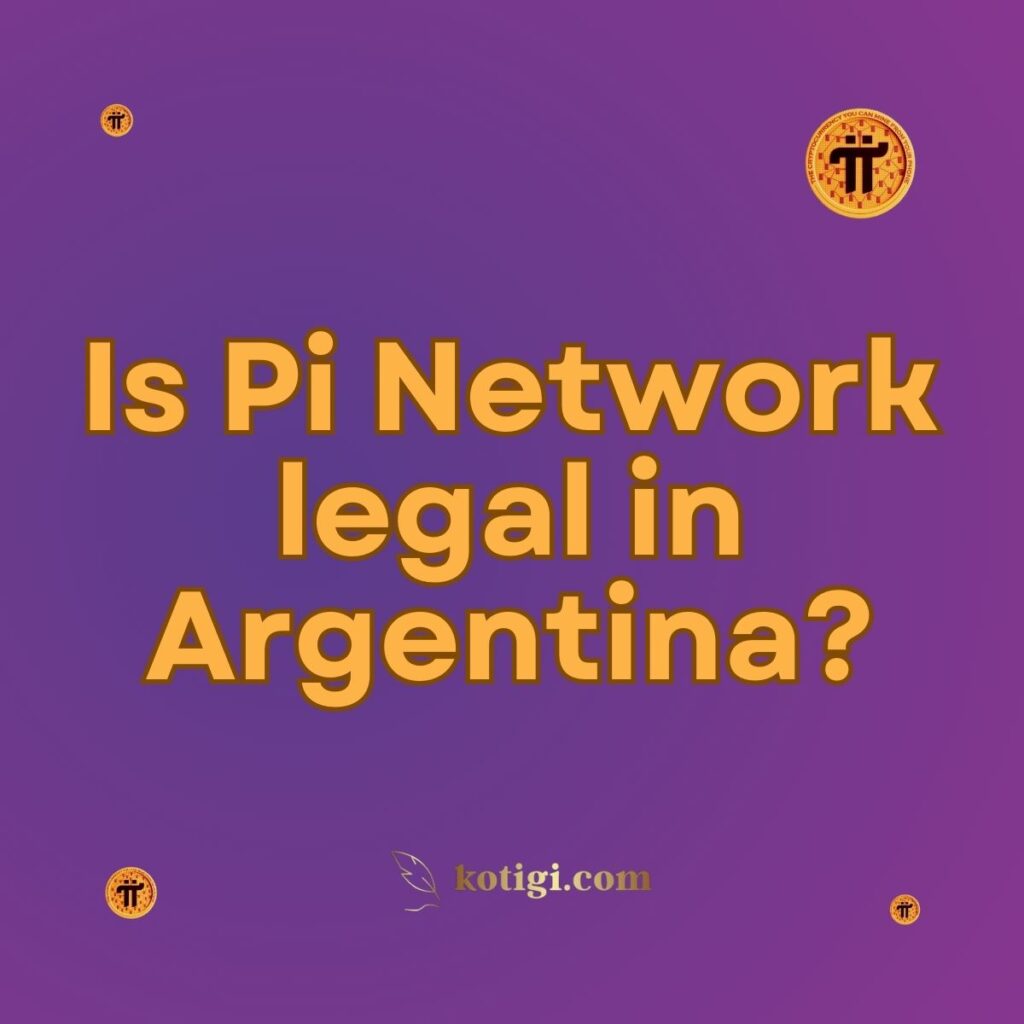
Is Pi Network legal in Argentina?
In Argentina, Pi Network is legal, and users are free to mine and participate in the platform. However, like most cryptocurrencies, it is not officially recognized as legal tender. Argentina has no specific regulations targeting Pi Network, but participants should remain aware of the country’s evolving stance on digital currencies.
Introduction
Argentina, a country grappling with economic instability and high inflation rates, has seen an increasing interest in cryptocurrencies. Digital currencies are viewed as a potential hedge against inflation, with platforms like Pi Network gaining traction. While Argentina has not established clear-cut regulations for decentralized networks like Pi, the country’s stance on cryptocurrency is cautious yet permissive.
In this post, we explore whether Pi Network is legal in Argentina, the current regulatory landscape, and what participants should consider while using Pi in the country.
1. Argentina’s General Approach to Cryptocurrencies
Argentina does not have a strict regulatory framework for cryptocurrencies, which has allowed platforms like Pi Network to grow in popularity among users looking to protect their savings from inflation.
1.1 Legal Framework for Cryptocurrencies
Argentina has not passed any specific legislation that bans or fully regulates cryptocurrencies, including Pi Network. However, the government has issued general guidelines about the use of digital currencies, advising caution but not imposing significant restrictions.
1.2 Recognition of Digital Currencies
While cryptocurrencies like Bitcoin are not considered legal tender in Argentina, they are not illegal. This same principle applies to Pi Network, which is seen as an emerging cryptocurrency platform. Users are free to mine Pi coins, although they should be aware of the risks associated with unregulated currencies.
1.3 Warnings from the Central Bank
The Central Bank of Argentina has issued warnings about the risks of using cryptocurrencies, including volatility, fraud, and lack of consumer protection. Although these warnings do not specifically target Pi Network, they emphasize the need for caution among users.
2. Pi Network’s Legality in Argentina
Pi Network operates within the same legal gray area as other cryptocurrencies in Argentina, meaning it is legal to use but remains unregulated.
2.1 No Specific Regulation for Pi Network
Pi Network has not been targeted by specific regulations in Argentina, meaning users can legally mine and hold Pi coins. However, since the country lacks a well-defined legal framework for digital currencies, participants should exercise caution and remain informed about potential changes in the law.
2.2 Cryptocurrency Mining in Argentina
Pi Network’s mining process differs from traditional cryptocurrency mining, which is energy-intensive. Since Pi Network uses a more energy-efficient, mobile-based mining system, it faces fewer environmental and regulatory challenges compared to other cryptocurrencies like Bitcoin. Argentina currently allows cryptocurrency mining, so Pi Network users can participate in this activity without legal concerns.
2.3 User Caution in an Unregulated Environment
Despite the legality of Pi Network, the lack of regulation in Argentina means that participants are exposed to certain risks. Users should be aware that Pi coins are not backed by any government or financial institution, and any losses or fraud associated with the platform may not be recoverable under Argentine law.
3. Argentina’s Cryptocurrency Regulation Trends
Argentina’s regulatory approach to cryptocurrencies has evolved in response to increasing adoption. Although the government has not yet introduced comprehensive cryptocurrency regulations, there are indications that this could change as digital currencies become more widespread.
3.1 Increasing Adoption of Cryptocurrencies
Argentina has one of the highest adoption rates of cryptocurrencies in the world due to its economic challenges. Cryptocurrencies are often used as a store of value in the face of inflation. This growing adoption may prompt the government to introduce stricter regulations in the future.
3.2 Potential Regulatory Changes
As more Argentinians engage in cryptocurrency-related activities, the government may decide to impose clearer regulations. While Pi Network users currently operate without restrictions, future laws could introduce new requirements or restrictions, such as taxation or reporting obligations for cryptocurrency holdings.
3.3 The Role of AFIP in Cryptocurrency Oversight
Argentina’s Federal Administration of Public Revenue (AFIP) is increasingly focused on regulating cryptocurrency transactions. Although no specific guidance has been issued for Pi Network, users should be aware of the potential tax implications that could arise as Argentina develops its cryptocurrency policies.
4. Tax Implications for Pi Network Users in Argentina
While Pi Network’s legal status remains unregulated, participants should be mindful of potential tax obligations that may apply to cryptocurrency earnings.
4.1 Cryptocurrencies and Argentina’s Tax Authority
The AFIP requires individuals to report any income generated from cryptocurrency transactions. Although Pi Network is still in its pre-launch phase and Pi coins cannot yet be traded, participants should stay informed about tax developments, as future earnings from Pi may be subject to income or capital gains taxes.
4.2 Reporting Cryptocurrency Holdings
In Argentina, cryptocurrency holdings may need to be reported to tax authorities, especially if Pi Network coins become tradeable in the future. Users should consult with tax professionals to ensure they comply with any reporting requirements that apply to their cryptocurrency activities.
4.3 Future Tax Legislation for Cryptocurrencies
While Pi Network’s pre-launch phase means there are no immediate tax implications for mining Pi coins, users should be prepared for potential changes in tax legislation as Argentina develops its cryptocurrency regulations. This could include taxes on mined coins or transactions made using Pi in the future.
5. Risks for Pi Network Users in Argentina
Pi Network users in Argentina, while currently operating legally, face several risks associated with participating in an unregulated cryptocurrency platform.
5.1 Lack of Consumer Protection
Since Pi Network operates in an unregulated space, users do not have the same level of consumer protection that they might expect from traditional financial institutions. This exposes participants to risks such as fraud, scams, and platform malfunctions. Without government oversight, recovering lost funds may be difficult.
5.2 Potential for Future Regulatory Restrictions
As cryptocurrencies become more integrated into the Argentine economy, Pi Network could face restrictions on its operations. This could involve limitations on mining activities, the trading of Pi coins, or even outright bans, depending on how future regulations are shaped.
5.3 Economic Instability and Cryptocurrency Volatility
Argentina’s economic instability may also contribute to fluctuations in the value of cryptocurrencies like Pi. Users should be prepared for the inherent volatility of digital currencies and consider the potential financial risks involved in mining or holding Pi coins.
6. Pi Network’s Efforts to Ensure Legal Compliance
Despite operating in an unregulated space, Pi Network has taken steps to ensure that its platform aligns with global standards for legality and user protection.
6.1 Pi Network’s Know Your Customer (KYC) Process
One of Pi Network’s key compliance measures is its Know Your Customer (KYC) process. This verification system ensures that users are legitimate and helps prevent fraud and illegal activities on the platform. Argentina does not currently require KYC for cryptocurrency users, but this measure could help Pi Network align with future regulatory requirements.
6.2 Privacy and Data Security for Argentine Users
Data privacy is a significant concern for cryptocurrency users, especially in light of Argentina’s Data Protection Law (Law No. 25.326). Pi Network’s privacy policies are designed to comply with global data protection standards, providing Argentine users with a higher level of security for their personal information.
6.3 Preparing for Future Regulatory Developments
Pi Network has expressed a commitment to complying with regulations in every country where it operates. As Argentina continues to develop its cryptocurrency laws, Pi Network may collaborate with local authorities to ensure that its platform remains compliant and accessible to users in the country.
Conclusion
Pi Network is currently legal in Argentina, and users can participate in its mining activities without facing significant legal barriers. However, like other cryptocurrencies, Pi is not recognized as legal tender, and users should be aware of the regulatory risks associated with participating in an unregulated platform.
While Argentina’s government has yet to impose strict regulations on Pi Network or other cryptocurrencies, the growing adoption of digital currencies suggests that future legal changes are possible. Users should stay informed about evolving regulations and tax obligations to ensure their activities on Pi Network remain compliant.
Key Takeaways
- Pi Network is legal in Argentina, but cryptocurrencies are not considered legal tender under current laws.
- Argentina has no specific regulations targeting Pi Network, though users should be mindful of future legal developments.
- Pi Network users in Argentina may face tax obligations in the future, especially if Pi coins become tradeable assets.
- Pi Network’s KYC process aligns with global standards, helping to ensure the platform remains compliant with potential future regulations in Argentina.
- Users should be aware of the risks of participating in an unregulated environment, including the lack of consumer protection and the possibility of future restrictions on cryptocurrency activities.





